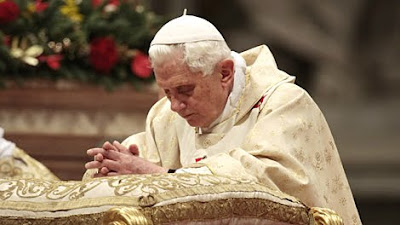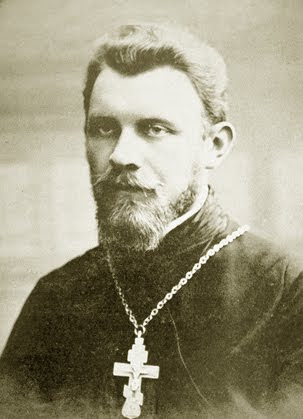Perhaps many of you have already heard about this, but it has only just come to my attention. Back on the 24th of September, extracts of a letter from Pope Emeritus Benedict to an Italian atheist mathematician, Piergiorgio Odifreddi, were published in the Italian newspaper, La Republica. The letter was a response to Odifreddi's 2011 book entitled Dear Pope, I am writing you, which was itself a reply to Benedict's book, Introduction to Christianity.
It is really wonderful and edifying to read such a clear and precise defence of the Faith against the attacks of of an atheist. What has been published is only extracts of what must be quite a long letter. I would very much like to see the whole thing!
Thank you very much to Fr Gashwin Gomes for making this translation and for making it available on HIS BLOG.
Respected Professor Odifreddi, (…) I would like to thank you for engaging with my book in such detail, and so also, with my faith; this is precisely what I had intended to do, for the large part, in my discourse to the Roman Curia in the Christmas of 2009. I must also thank you for the fair treatment you have given my text, seeking sincerely to do it justice.
My judgment concerning your book, on the whole is, however, in itself rather mixed. I have read some parts of it with enjoyment and profit. In other parts, instead, I marveled at a certain aggressiveness and recklessness of argumentation. (…)
Many times it [your text] pointed out to me that theology would be science fiction. In this respect, I marveled that you still considered my book worth of such a detailed discussion. Please permit to propose with respect to such questions, four points.
It is correct to affirm that only mathematics is “science” in the narrowest sense of the word; and meanwhile I have learned from you that even here one must distinguish again between arithmetic and geometry. In all specific subjects, in any case, the scientific character [la scientificità] has its own form according to the uniqueness of its object. What is essential is that one applies a verifiable method, excludes arbitrariness, and ensures rationality in each of their different modalities.
One should at least acknowledge that in the area of history, as well as that of philosophy, theology has produced lasting results.
An important function of theology is that of keeping religion linked to reason, and reason, to religion. Both these functions are of essential importance to humanity. In my dialogue with Habermas, I have shown that there exist pathologies of religion and – not less dangerous – pathologies of reason. Each has a need of the other, and to keep them continually connected is one of the tasks of theology.
Science fiction exists, on the other hand, in the ambit of many sciences. That which you explain about theories concerning the beginning and the end of the world in Heisenberg, Schrödinger, etc., I would designate as science fiction in the good sense of that phrase: they are visions and anticipations, in order to reach a true knowledge, but they are also, precisely, only imaginations with which we seek to come close to reality. There indeed exists, science fiction in a grand style, for instance, within the theory of evolution. The “selfish gene” of Richard Dawkins is a classic example of science fiction. The great Jacques Monod wrote some sentences that he himself has certainly inserted in his work only as science fiction. I quote, “The emergence of tetrapod vertebrates ... draws its origin from the fact that a primitive fish ‘chose’ to go and explore the land, on which, however, it was unable to move except by jumping clumsily and thus creating, as a result of a modification of behavior, the selective pressure due to which the sturdy limbs of tetrapods would develop. Some of the descendants of this bold explorer, this Magellan of evolution, can run at a speed of 70 miles per hour ... " (“Chance and Necessity.” Italian edition. Milan 2001. p. 117.)
In all the subjects we have discussed so far, one is dealing with a serious dialogue, for which I – as I have already said repeatedly – am grateful. Things are different in the chapter about the priesthood and Catholic morality, and even more different in the chapters about Jesus. With respect to what you say about the moral abuse (sic) of minors by priests, I – as you know – take note only with deep concern. I have never tried to conceal these things. That the power of evil penetrates to such an extent in the interior world of faith is for us a suffering which, on one hand, we have to endure, and on the other, we must, at the same time, do everything possible so that cases of this type are not repeated. Nor is it at all any source of comfort to know that, according to the research of sociologists, the percentage of priests guilty of these crimes is not higher than those present in other similar professional categories. In any case, one must not ostentatiously (sic) present this deviation as if it were a filth specific to Catholicism.
If it is not licit to keep silent about evil in the Church, one should not also, however, keep silent about the great wake of goodness and purity that the Christian faith has carried [tracciato, tracked] down the centuries. One needs only remember the great and pure figures the faith has produced – from Benedict of Nursia and his sister, Scholastica, to Francis and Clare, to Teresa of Avila and John of the Cross, and the great saints of charity such as Vincent de Paul and Camillus de Lellis, all the way to Mother Theresa of Calcutta, and the great and noble figures of 19th century Turin. And it is true even today that the faith pushes many persons to love disinterestedly, to the service for others, to sincerity and to justice. (…)
What you say about Jesus is not worthy of your rank as a scientist. If you pose the question whether, in the end, we know nothing of Jesus as a historical figure, that there is nothing ascertainable, then I can only invite you to become a little more competent from a historical point of view. I recommend to you for this, above all, the four volumes that Martin Hengel (exegete of the Protestant Theological Faculty of Tübingen) has published with Maria Schwemer: it is an excellent example historic precision and of the widest historical information. In light of this, what you say about Jesus is reckless speech which must not be repeated. That in exegesis there have also been written many things with a lack of seriousness is, of course, incontestable. The American seminary you cite on p. 105 (and ff.) concerning Jesus, only confirms once again what Albert Schweizer had noted with respect to the Leben-Jesu-Forschung (The Quest for the Life of Jesus), and that is that the so-called “Historical Jesus” is no more than a mirror of the ideas of the authors. Such forms of botched historical works, however, do not compromise the importance of serious historical research, which has led us to true and reliable knowledge about the proclamation and figure of Jesus.
(…) I have also to forcefully reject your claim (p. 126), that I have presented historical-critical exegesis as a tool of the Antichrist. In treating the story of Jesus’ temptations, I have only taken Soloviev’s thesis, according to which the historical-critical method can also be used by the Antichrist – a fact which is indisputable. At the same time, however - and particularly in the preface to the first volume of my book on Jesus of Nazareth - I explained clearly that historical-critical exegesis is necessary for a faith that does not propose myths with historical images, but calls for a genuine historicity and therefore must present the historical reality of its claims in a scientific manner. For this reason, it is not even correct that you tell me I would be interested only in metahistory: on the contrary, all my efforts aim to show that the Jesus described in the Gospels is also the real historical Jesus; that they deal with a story [storia] that actually took place. (…)
With the 19th chapter of your book, we turn back to the positive aspects of your dialogue with my thinking. (…) Even if your interpretation of John 1:1 is very far from what the evangelist intended to say, there exists, still, a convergence that is important. If you, however, want to replace God with “Nature,” the question remains as to who or what this nature is. Nowhere do you define it, and thus it appears as an irrational deity who explains nothing. I would like, however, to note further that in your religion of mathematics, three fundamental themes of human existence are not considered: freedom, love and evil. I marvel that you, with one nod, liquidate freedom, which has been, and remains, the core value of the modern epoch. Love does not appear in your book, and there is no information concerning evil. Whatever neurobiology might say or not say concerning freedom, in the real drama of our history [storia], it is present as a determining reality and must be taken into consideration. However, your religion of mathematics has no information concerning evil. A religion that omits these fundamental questions, remains empty.
Most respected Professor, my critique of your book is, in parts, harsh. But frankness is a part of dialogue; only thus can knowledge grow. You have been very frank, and therefore you will accept that I will also be. In any case, however, I value very much the fact that you, through your engagement with my “Introduction to Christianity,” have sought such an open dialogue with the faith of the Catholic Church and, notwithstanding all the disagreements in the main part, convergences have also not been missing.
With cordial greetings and every good wish for your work ...
Pope Emeritus Benedict continues to feed the faithful and the stray sheep alike.












































































































